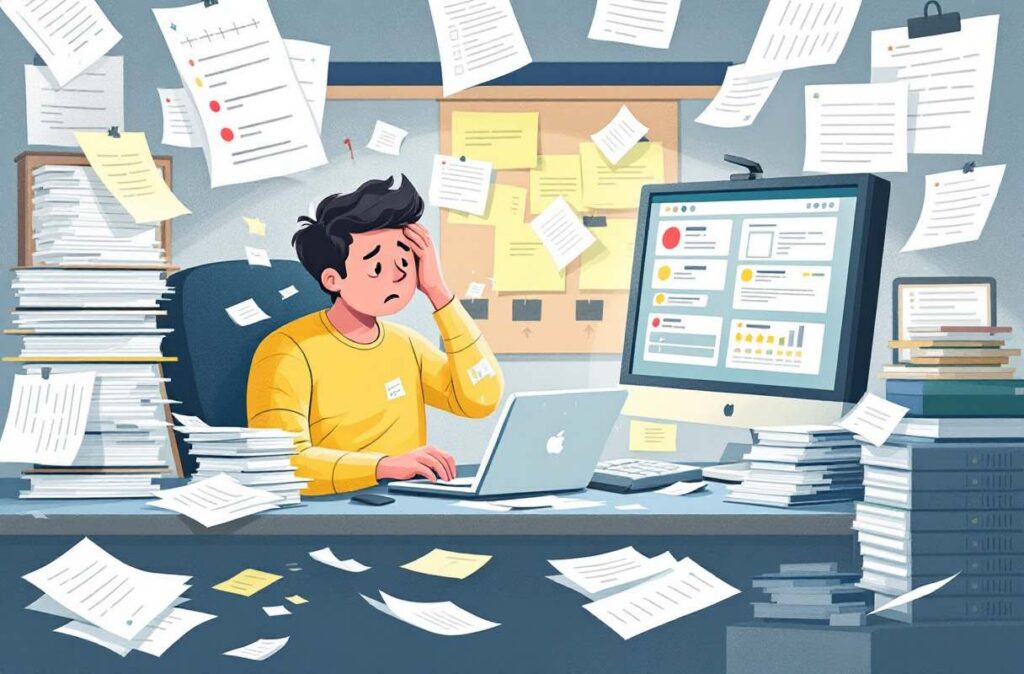Feeling like work has become a never-ending rollercoaster of stress? You’re not alone. Work stress can creep up on anyone, turning daily tasks into daunting challenges and affecting both your professional and personal life.
But here’s the good news: understanding the roots of your stress is the first step toward reclaiming control. Let’s dive into what causes work stress and explore effective strategies to tackle it head-on.
Understanding Work Stress
Getting the lowdown on work stress is all about learning how to tackle it head-on. It’s the kind of thing that can sneak up on anybody, tossing a hand grenade into your day both at home and on the job.
“Stress is not what happens to us. It’s our response to what happens, and response is something we can choose.” — Maureen Killoran, Life Coach
What Causes Work Stress?
There are a bunch of reasons why work stress might creep in. While it hits everyone a bit differently, some usual suspects include:
| Cause | Description |
|---|---|
| Heavy Workload | Too much stuff on your plate can feel like climbing a mountain without a safety rope. |
| Tight Deadlines | Racing against the clock feels like running a marathon in flip-flops, and it ain’t pretty. |
| Poor Work Environment | Hanging out in a negative or draining workplace can crank up the stress faster than rush hour traffic. |
| Lack of Control | Feeling like the job has the steering wheel and you’re just in the back passenger seat—frustrated much? |
| Inadequate Support | Trying to do it all with no backup can leave you feeling like a lone wolf with no pack. |
Figuring out these triggers is the first step. Once you can point a finger at what’s stressing you, you can take the leap to deal with it.

Impact of Work Stress on Mental Health
Work stress is more than a bad case of the Mondays—it can mess with your mind big time. Some of the usual ways it shows up include:
| Impact | Description |
|---|---|
| Anxiety | It’s like having a swarm of bees buzzing non-stop in your brain. |
| Depression | When the gloomy clouds hang overhead a little too long. |
| Burnout | Like a phone battery that’s always on the last bar, the energy’s zapped. |
| Decreased Job Satisfaction | When clocking in feels like you’re slowly wading through glue. |
| Impaired Concentration | Stress ties your brain in knots, making it tough to stay on the ball. |
Knowing the toll work stress can take on mental health is a game changer. If you’re feeling the crunch, check out some lifesavers like quick stress relief techniques and see if a tailor-made stress management plan could help get you back in the driver’s seat.
Self-Assessment
Checking in with ourselves can really cut down on work stress. When you spot what’s getting under your skin at work, you can do something about it and feel better mentally.

Recognizing Signs of Work Stress
Knowing what stress looks like can really help you deal with it at work. Check out the table of symptoms to see if any of these are bugging you:
| Symptom | Description |
|---|---|
| Fatigue | Feeling pooped, kind of like a phone on low battery |
| Irritability | Snappier than a bowl of Rice Krispies |
| Difficulty Concentrating | Brain’s playing hide and seek instead of getting stuff done |
| Sleep Disturbances | Counting sheep ain’t cutting it—you’re tossing and turning all night |
| Physical Symptoms | Those nagging headaches, achy muscles, or upset stomachs that refuse to chill, explored more in our article on physical symptoms of stress |
Catching these signs early can be your first step in telling work stress to take a hike.
Identifying Triggers in Your Work Environment
Every job brings its own set of stuff that makes you want to pull your hair out. Figuring out what bugs you most is a big deal for kicking work stress to the curb. Some usual suspects are:
- Workload: Buried under mountains of tasks or buried by deadlines.
- Interpersonal Conflicts: Awkward chats and weird vibes with coworkers or bosses.
- Work-Life Balance: Feeling like work is creeping into your chill time.
- Unclear Expectations: Trying to decode what exactly you’re supposed to be doing.
A stress journal can be your best bud here. Jot down stuff that makes you stress-eat or lose your cool, and you might notice some interesting patterns. Need a starting point? Our article on stress journal prompts can guide you.
The first step in stress-busting is knowing what’s up. Spotting the stress signs and what sets you off helps in snagging some cool coping hacks. For extra tips, give our guides on setting boundaries stress and time management stress relief a look.

Healthy Work Habits
Taking on some good work habits is a game-changer when it comes to dealing with the pressure of work-life. The secret sauce: setting limits and figuring out how to manage your time like a pro.
“The key is not to prioritize what’s on your schedule, but to schedule your priorities.” — Stephen Covey, Author of The 7 Habits of Highly Effective People
Setting Boundaries
Drawing a line in the sand is key for keeping your work and home life in check. It’s like having a force field around your brain! It helps you keep your mental mojo intact while kicking burnout to the curb. Plus, you get to guard your me-time and keep your stress levels from hitting the roof.
Here’s how you can do it right:
| Boundary Type | Details |
|---|---|
| Work Hours | Mark your work hours in bold! Know when to hit the brakes and let your coworkers in on your schedule to dodge those pesky distractions. |
| Workspace | Carve out a spot that screams ‘workspace!’ Keeping your job zone separate from your chill zone can work wonders for your focus. |
| Communication | Zip the lip after work hours. Set ground rules about when you’ll be checking those emails or messages—your brain needs downtime, too! |
| Breaks | Pencil in some regular pit stops during the day. Keeping your brain from going into overdrive can save the day! |
Looking for more wisdom on setting those much-needed boundaries? Check out our piece on setting boundaries stress.
Time Management Techniques
Getting your ducks in a row time-wise can take a load off your shoulders. When you’ve got your tasks all lined up and know exactly how much time to devote to them, you can keep those anxious, overwhelming feels in check.
Check out these life-savers:
| Time Management Method | What’s Involved |
|---|---|
| Prioritization | Lean on the Eisenhower Matrix to sort urgent tasks from important ones. It lets you focus on the real deal without sweating the small stuff. |
| To-Do Lists | Jot down your daily mission. It keeps your priorities sharp and stops you from going on a wild goose chase. |
| Time Blocking | Set aside chunks of your day for specific tasks. Talk about a vision quest for productivity and focus! |
| Pomodoro Technique | Hit it hard for about 25 minutes, then give yourself a swift breather. It keeps your brain nimble and keeps burnout at bay. |
Need more tricks up your sleeve? Peek into our article on time management stress relief.
By weaving boundaries and time management hacks into your work routine, you’re doing yourself a solid. It’s all about making the workspace a happier place, giving your mental health a high-five, and making chronic stress a thing of the past.
Coping Strategies
Handling work stress might seem like trying to juggle flaming torches, but with the right tricks up your sleeve, you can keep your cool. Two fan-favorites for turning down the heat are squeezing in stress-busting activities and indulging in a little mindfulness magic.

Stress-Relief Activities
Sneaking stress-chillers into your day can really kick mental fatigue to the curb. They’re not just a time-out from work; they add that much-needed chill factor to your life. Here’s a quick lowdown on what you can do:
| Activity | Time Spent | Why It’s Awesome |
|---|---|---|
| Strolling or jogging | 30 mins | Lifts spirits, keeps worries away |
| Bending with yoga | 20-60 mins | Loosens up, cools the head |
| Dabbling in doodles | 30 mins | Sparks creativity, let’s it all out |
| Grooving to tunes | 15-30 mins | Boosts joy, melts stress away |
| Flipping through pages | 20-60 mins | Offers a getaway, sharpens focus |
For super speedy stress hacks that fit into hectic days, swing by our piece on quick stress fixers.
Mindfulness and Meditation
Mindfulness and meditation act like the trusty sidekick in the battle against work blues. Being in the here and now helps yank the reins on those runaway emotions, offering a clearer mind. Plus, saying goodbye to the stress hormone, cortisol—that’s a win.
| Technique | Time Spent | Why It’s Rocking |
|---|---|---|
| Breathing deeply | 5-10 mins | Brings heartbeats down, invites calm |
| Meditation with a guide | 10-30 mins | Sharpens focus, eases tension |
| Checking in with your body | 15-30 mins | Heightens awareness, eases knots |
If breathing techniques are your jam, take a peek at our guide on breathing tricks for stress. Consistent practice doesn’t just bring peace but builds a solid stress-busting routine.
Making time for these activities in your day-to-day can be like a secret power-up to tackle the work grind, boosting the feel-good vibe in life.
Building Support Systems
Wrangling with work-related stress? A bit of backup can go a long way. When you’ve got that gang to lean on, life gets a whole lot less rough. Having friendly faces around can lift you up and tackle those stressy bits together.

Seeking Help from Colleagues
Colleagues — not just the folks who hog the printer, right? They can be the buddies you need to shake off some of that work stress. When everybody’s open to chat, the workplace starts feeling like a place where you’ve got each other’s backs. Swapping war stories with people who get it can stop you from feeling like you’re on an island. You might even learn a trick or two for smoothing over those troublesome times.
Loads of studies back it up: having work pals you can count on keeps your noggin happy. Here’s how having someone at your side makes a difference:
| What You Get | How It Helps |
|---|---|
| Chewing the Fat with Peers | Boosts your toolkit of stress-coping tricks |
| Teaming Up | Lightens the load so it ain’t all on you |
| Hanging Out | Lifts your spirits and kicks loneliness to the curb |
Rolling up your sleeves as part of a team and leaning on colleagues can make handling job hassles feel less like juggling flames. It’s a good idea to start a vibe where yapping about stress is okay. Makes the whole work scene a better mental space.
Utilizing Employee Assistance Programs
Enter the Employee Assistance Programs (EAPs) — these are your secret weapon for when stress gets too intense. They offer a grab bag of services that’ll be your stress-busting sidekick. All hush-hush and geared to iron out those mental creases and life hassles.
From counseling to stress-buster workshops, EAPs dish out plenty of helpful commodities:
- One-on-one counseling
- Work-life balance workshops
- Handy online tips and tools
Here’s a glance at what typical EAP services offer and how they help:
| What They Do | What It’s About | Why It Helps |
|---|---|---|
| One-on-One Talks | Chatting about mental bumps with a pro | Gives you strategies and someone to lean on |
| Life Balancing Acts | Resources for juggling work and personal stuff | Can lower the stress-o-meter |
| Crisis Crew | Aid in tough personal or work jams | Ready with help and guidance when it’s really needed |
EAPs can dish out everything you need to cook up a solid stress game plan. They’re loaded with gear to help you handle stress, no matter if it’s personal or pro. Getting teammates to tap into these resources can grow that united, supportive vibe in the workplace.
By joining forces with colleagues and tapping into EAPs, you build the backup you need to take on work stress — and give your mental well-being a boost in the process.
Lifestyle Changes
Tweaking how you live can really help handle job stress better. Zeroing in on getting moving and eating well can up your overall wellness game and make dealing with work jitters a breeze.
Exercise and Physical Activity
Doing your happy dance, real or metaphorically, helps knock down stress levels and pumps up your spirits. When you move, your body releases the feel-good endorphins, and that’s like nature’s own pep rally. Each week, it’s good to carve out some time for these mood-boosters.
| Type of Activity | How Much Time You Need Weekly |
|---|---|
| Break-a-Sweat Sessions (e.g., brisk walk) | 150 minutes |
| Challenge Yourself Activities (e.g., running) | 75 minutes |
| Muscle Building Fun (e.g., weights) | 2 days |
Shake things up with activities you actually like—try dancing, biking, or taking a dip. Make it regular, and it won’t seem like a slog. Need more ideas? Check out our guide on best exercises for stress.
Healthy Eating Habits
What goes on your plate has a big say in how you feel and stress’s hold on you. Chowing down on a balanced diet can perk up your energy and spirits. Load up on food that’s got all the good stuff like vitamins and minerals to help fight off stress.
| Food Group | Why It’s Good for You |
|---|---|
| Fruits and Vegetables | Packed with vitamins and powers up your antioxidant defense |
| Whole Grains | Keeps your energy steady |
| Lean Proteins | Boosts those brain chemicals you need |
| Healthy Fats (e.g., nuts, avocados) | Brains need this stuff to keep running smoothly |
Switching processed junk for nutrient-rich choices can clear your head and build a stress shield. Want more tips on stress-busting bites? See our guide on foods that reduce stress.
Pairing a good exercise shuffle with smart eating sets you up nicely for tackling work stress head-on. Make these tweaks and watch your mental health and life, in general, get a bit brighter.
Seeking Professional Help
Sometimes work stress hits like an avalanche. When that happens, reaching out for professional help can be your lifeline. Options include counseling, therapy, meds—you know, the works.
Counseling and Therapy Options
Counseling and therapy give you the chance to spill your guts about work stress in a safe, judgment-free zone. The pros got your back with advice, coping hacks, and emotional support. Here’s the lowdown on what’s available:
| Therapy Type | What’s the Deal? |
|---|---|
| Individual Therapy | Just you and the expert, tackling your personal stress explosions one-on-one. |
| Group Therapy | You’re not alone here. Get support and swap coping hacks with others in the same boat. |
| Cognitive Behavioral Therapy (CBT) | Shake off those pesky negative thoughts with a plan. Kind of like Marie Kondo-ing your stress. |
| Mindfulness-Based Therapy | Chill out with some zen techniques to keep anxiety at bay and feel more at ease. |
Jumping into any of these therapies can help keep work stress from taking over your life. Want fast relief on the fly? Check out our quick stress relief techniques.
Medication and Treatment Plans
Sometimes, popping a pill can make a huge difference when fighting work stress. If stress is camping out long term, meds might be your friend. Here’s the 411 on some you might get:
| Medication Type | What’s It Do? |
|---|---|
| Antidepressants | Kicks negative vibes like sadness and anxiety to the curb. |
| Anti-anxiety Medications | Quick fix for those monster anxiety attacks. |
| Beta-Blockers | Keeps your heart from doing the Macarena when stress hits. |
Team up with your healthcare provider to whip up a stress-busting game plan that works for you. When you’re curious about stress’s mean side, check out our article on physical symptoms of stress.
With a sprinkle of professional help, you’ll be tackling work stress like a pro in no time.
Conclusion
Work stress might seem overwhelming, but with the right strategies, you can navigate it successfully and enhance your overall well-being. By recognizing the signs, setting healthy boundaries, adopting stress-relief activities, and seeking support when needed, you’re not just surviving the workday—you’re thriving. Remember, it’s okay to reach out for help and make changes that prioritize your mental health. After all, a balanced you is better equipped to handle the challenges and enjoy the successes that come your way.
FAQs
- What are the common causes of work stress?
Common causes include heavy workloads, tight deadlines, a poor work environment, lack of control over tasks, and inadequate support from colleagues or management. - How does work stress affect mental health?
Work stress can lead to anxiety, depression, burnout, decreased job satisfaction, and impaired concentration, impacting both your professional performance and personal well-being. - What are the signs that I’m experiencing work stress?
Signs include fatigue, irritability, difficulty concentrating, sleep disturbances, and physical symptoms like headaches, muscle tension, or upset stomach. - How can I effectively manage work stress?
Effective strategies include setting boundaries between work and personal life, practicing time management, engaging in stress-relief activities like exercise or hobbies, practicing mindfulness and meditation, and building a support system. - When should I seek professional help for work stress?
If stress becomes overwhelming and affects your daily functioning or mental health significantly, it’s important to consult a professional counselor or therapist for guidance.
Additional Resources
- American Psychological Association: Work, Stress, and Health
APA – Work Stress - Centers for Disease Control and Prevention: Workplace Health Promotion
CDC – Workplace Stress - National Institute of Mental Health: 5 Things You Should Know About Stress
NIMH – Coping with Stress









Wonderful beat I wish to apprentice while you amend your web site how could i subscribe for a blog web site The account aided me a acceptable deal I had been a little bit acquainted of this your broadcast provided bright clear idea